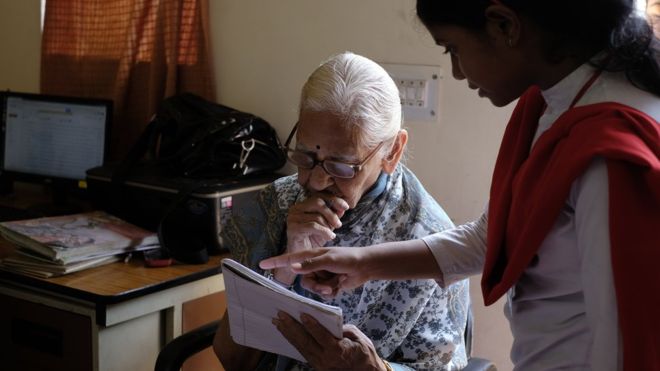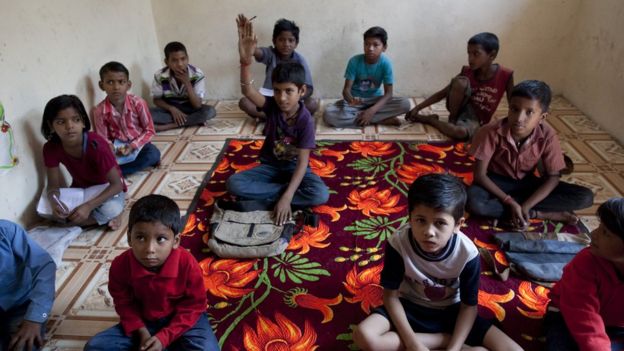
- 1 May 2016
- From the section India
Image copyright Mansi Thapliyal
Image caption Guldasta's students are taught English, science, maths and environment
Vimla Kaul has not stopped working since she retired as a government school teacher 20 years ago. The 81-year-old educates under-privileged children in India's capital Delhi. She spoke to the BBC's Ayeshea Perera.
A group of children shout "good morning" at the top of their voices as Vimla Kaul walks into Guldasta school.
Twelve of them, 11 boys and one girl, are sitting on the floor of a tiny room, where colourful posters bravely attempt to cover the stains and patches on the walls. They immediately begin chanting the English alphabet - "A for Apricot, B for Blackberry" - fruits that many of them are unlikely to have seen, let alone eaten.
Unsung IndiansThis is the 14th and final article in a BBC series Unsung Indians, profiling people who are working to improve the lives of others.
One little boy is wearing a shirt with a large tear in the sleeve, while the youngest member of the class, a three-year-old, is punching his slightly older brother.
All the children are from around the area - their parents mostly work as maids or drivers, servicing the middle class housing colony across the road.
'Silly mistakes'Guldasta's students are taught English, science, maths and environment. It also owns one computer and offers extra-curricular activities like yoga, dance and drill.
Mrs Kaul settles into a classroom where children are sitting and begins checking their work.
"You have to be careful of silly mistakes like this," she tells a student, circling a sum on a page, before pronouncing the rest of her work as "very good".
She sets high standards for her students.
Image copyright Mansi Thapliyal
Image caption The children sit on the floor of the tiny room that serves as their class
Image copyright Mansi Thapliyal
Image caption The youngest child in the class is just three-years-old
"Many government schools do children a disservice. They don't teach them properly, and then follow a no-detention policy. What you are left with are teenagers who can't construct a basic sentence in either English or Hindi," she tells the BBC.
"We don't turn anyone away, but we hold an entrance test to evaluate the standard of the child, and if they perform poorly at class examinations we hold them back," she says.
"The main thing is to teach them properly."
Her own school building is a tiny four-room tenement, of the kind generally used to provide cheap, basic accommodation to labourers.
Huge improvementTo access it, you have to navigate a dusty lane smelling strongly of cowpats, and climb one floor of a narrow, dirty staircase.
But even this decrepit building, overlooking a junk storage yard is a huge improvement - until two years ago, Guldasta operated out of a park belonging to the local municipality.
"It would be too hot for the children in the summers and too cold in the winters, but we didn't have the funds for anything else," one of the teachers says.
Image copyright Mansi Thapliyal
Image caption Students are evaluated carefully before they are passed on to the next class
Image copyright Mansi Thapliyal
Image caption Guldasta owes its existence to the sheer tenacity of Mrs Kaul and her husband HM Kaul
Established in 1993, Guldasta owes its existence to the sheer tenacity of Mrs Kaul and her husband HM Kaul, who died in 2009.
"My husband and I had both just retired. We decided to do something charitable, but were not quite sure what."
That question was answered during a visit to the village of Madanpur Khadar, an hour away from Delhi.
A school is bornAs the couple sat at the village centre with some elders, discussing their problems, they were continually distracted by the half-naked, boisterous children running around.
"We had brought biscuits for them as part of a Rotary Club drive. But one woman told me, 'giving them to eat is all very well, but what you should do is teach them how to get their own food.' That stuck with me."
And that was when the idea for a school was born.
But idea to implementation turned out to be an uphill task. It took six months for the couple to convince village officials to agree to the school and when it finally opened, they had just five students and one teacher.
Eventually they made the decision to shift the school to her housing colony in Sarita Vihar, where around 150 students immediately enrolled.
Image copyright Mansi Thapliyal
Image caption The school operated out of a park for almost a decade
Image copyright Mansi Thapliyal
Image caption Neighbours forced the school out of the colony where Mrs Kaul lived
Mrs Kaul recalls how she assumed she would get support for her charitable endeavour from other colony residents.
"How wrong I was", she says, laughing.
She first tried to set up her school in the community centre but was not allowed inside.
'Selfish classes'So she moved to a park inside the complex, but was forced out by neighbours who complained that the children were too noisy. She tried talking to them but finally moved to the municipal park after one woman went on a hunger strike.
They operated out of there for nearly 10 years, until an NGO discovered and adopted the school. This enabled them to finally rent the building to house it.
"There is an inherent selfishness among our class that don't want to see these people rise. Where will their maids come from otherwise?" she says.
The stories of many of her students, she says, are heart-rending.
Image copyright Mansi Thapliyal
Image caption The children's stories are often heart-rending
"I had one very bright young student who was pulled out because her mother wanted her to help clean houses to make more money. That was the end of her education," she says. Others come without food because their parents don't have the time, or can't afford it.
But others have happier stories.
Two of her students are teaching at Guldasta now, one of them with a computer degree. Another has found work as a mechanic. Yet another was working at a Chinese restaurant Mrs Kaul visited, where he proudly insisted that she would not pay for her meal that day.
"If I can lift even one child out of their circumstances, that's enough for me. But mostly, I want to give them a childhood. Some happy memories that they can look back on later in life."
http://www.bbc.com/news/world-asia-india-36147973


 RSS Feed
RSS Feed
